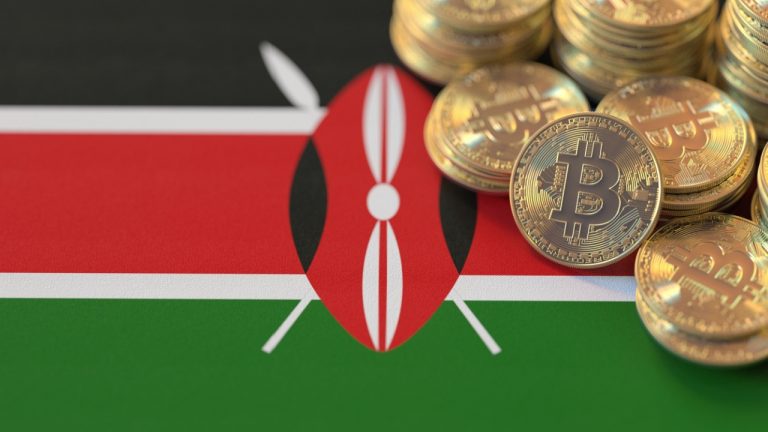
Marathon Digital, one of the world’s leading Bitcoin mining operations, announced a collaboration to overhaul Kenya’s renewable energy sector.
Bitcoin mining giant Marathon Digital recently announced a new partnership with Kenya’s Ministry of Energy and Petroleum (MOEP) to develop the country’s already thriving renewable energy sector.
The partnership will focus on exchanging technical knowledge and research, policy ideas, investment strategies, and the development of critical energy infrastructure.
In the wake of the newly inked collaboration, Marathon Digital CEO Fred Thiel noted the advantages of fostering such a relationship with Kenya’s Ministry of Energy and Petroleum:
 Robert Kiyosaki warns of an impending severe market crash and advises investing in assets like bitcoin, gold, and silver. Edward Snowden has issued a stern warning to Bitcoin developers, urging them to enhance privacy features at the protocol level. In Kenya, President William Ruto has enlisted Marathon Digital, a U.S.-based Bitcoin mining firm, to consult […]
Robert Kiyosaki warns of an impending severe market crash and advises investing in assets like bitcoin, gold, and silver. Edward Snowden has issued a stern warning to Bitcoin developers, urging them to enhance privacy features at the protocol level. In Kenya, President William Ruto has enlisted Marathon Digital, a U.S.-based Bitcoin mining firm, to consult […] The Kenyan government recently established a multi-agency technical working group tasked with developing a framework for regulating and monitoring the cryptocurrency industry. The group, which includes financial regulators such as the Central Bank of Kenya, is set to draft rules for controlling and monitoring Virtual Asset Service Providers (VASPs). FATF Grey Listing Threat The Kenyan […]
The Kenyan government recently established a multi-agency technical working group tasked with developing a framework for regulating and monitoring the cryptocurrency industry. The group, which includes financial regulators such as the Central Bank of Kenya, is set to draft rules for controlling and monitoring Virtual Asset Service Providers (VASPs). FATF Grey Listing Threat The Kenyan […]

Kenya’s police force reportedly arrested Nadeem Anjarwalla and may send the Binance executive to Nigeria to face charges with his colleague, Tigran Gambaryan.
Nadeem Anjarwalla, a British and Kenyan national who works at cryptocurrency exchange Binance, has reportedly been detained in Kenya after fleeing Nigeria in March.
According to several Kenyan news outlet reports from April 22, local police arrested Anjarwalla and may extradite the Binance executive to Nigeria to face criminal charges. Anjarwalla reportedly escaped custody in Nigeria on March 22 after he was taken to a mosque for prayers, fleeing the country using his Kenyan passport.
Cointelegraph was unable to confirm reports of Anjarwalla’s arrest in Kenya. He initially traveled to Nigeria in February with fellow Binance executive Tigran Gambaryan following claims the exchange manipulated the country’s fiat currency, the naira. Authorities detained both men after Binance announced that it intended to cease all naira transactions.
 N-PIK is an online gambling platform that utilizes its own PIK token, PLYP token to enable players to join raffles, as well as a comprehensive token-based economy to allow players to bet, wager, and win in the best games of skill and chance. The ecosystem’s platforms are already licensed in Uganda and Kenya. Li Aleksandr […]
N-PIK is an online gambling platform that utilizes its own PIK token, PLYP token to enable players to join raffles, as well as a comprehensive token-based economy to allow players to bet, wager, and win in the best games of skill and chance. The ecosystem’s platforms are already licensed in Uganda and Kenya. Li Aleksandr […]

The Capital Markets (Amendment) Bill will now be introduced to the lower chamber of the Kenyan parliament.
A bill defining crypto assets as securities and imposing capital gains tax on them has made it through a Kenyan parliamentary committee.
According to the Kenyan newspaper Business Daily on Dec.
“This is a very critical law that will guard our country against proceeds of crime and terrorism financing. We approve this Bill for publication.”
After the Committee’s approval, the bill will head to the reading stage in the National Assembly, the lower chamber of the Parliament of Kenya.
Related: Wallet crypto bot rolls out on Telegram in Colombia, SA and Kenya
The Capital Markets (Amendment) Bill, 2023, amends the country’s tax code, imposing taxes on crypto assets stored on crypto exchanges and digital wallets.
Should the bill pass, citizens of Kenya would be obliged to declare all their crypto assets and their value in Kenyan shillings to the Kenya Revenue Authority.
“A person who possesses or deals in digital currency shall provide the Authority with the following information for tax purposes—the amount of proceeds from the transaction, any costs related to the transaction and the amount of any gain or loss on the transaction.”
While Kenya is only preparing to introduce its crypto taxes, the tax services in other countries have recently been quite vocal in their desire to chase all those who didn’t declare their crypto accurately.

Kenya might become the first country in the world where the industry’s representatives would develop the regulatory framework for crypto.
Kenya might become the first country in the world where the industry’s representatives would develop the regulatory framework for crypto. According to the Blockchain Association of Kenya (BAK), The National Assembly’s Departmental Committee on Finance and National Planning has directed it to prepare the first draft of “what could become a virtual asset service provider’s bill.”
On Oct. 31, the Committee on Finance and National Planning invited the BAK representatives to discuss the digital assets regulation. BAK’s legal and policy director, Allan Kakai, shared the details behind the meeting with the local media:
“Basically, we are telling [the] parliament: ‘Look, Kenya has always branded itself as the Silicon Savannah; we are top three for digital assets [volume in Africa], and if we do not develop a clear licensing and regulatory framework, Nigeria, South Africa, Botswana, Namibia, Mauritius would take the lead, and the capital flow that would have come to Kenya would have flocked elsewhere.”
In response, the Committee gave the BAK two months to draft the crypto bill. The message in the Committee’s official X (former Twitter) account notes only that it “urged the Association to undertake robust public education on cryptocurrency trade to demystify it.”
Headline: Kenya to introduce digital IDs for citizens by year-end
In September 2023, Kenya introduced the Financial Act 2023, featuring the requirement for cryptocurrency exchanges to withhold 3% “of the transfer or exchange value of the digital asset.” The BAK, whose members haven’t gotten to dissuade the lawmakers from passing this crypto tax at the meeting in May, filed a complaint against it to the High Court of Kenya.
Kenyan authorities took a harsh stance against the controversial digital ID crypto project Worldcoin, co-founded by Sam Altman, the CEO of OpenAI. A parliamentary committee in Kenya’s government recommended that regulators shut down the project’s operations in the country, citing the personal data harvesting concerns.
Magazine: 6 Questions for Lugui Tillier about Bitcoin, Ordinals, and the future of crypto

The Kenyan government plans to roll out its digital identification system in December 2023 after the testing period, which will take the next few months.
The Kenyan government plans to roll out its digital identification system in December 2023 after the testing period, which will take the next few months. According to the president of Kenya, William Ruto, whose speech at the East Africa Device Assembly Kenya plant in Athi River was cited by local media on Oct.30:
“The digital ID, which has been a major problem to us for a very long time, is now on testing mode for the next two months. I have been assured by all the stakeholders and the ministries concerned that by December we will be able to launch digital IDs.”
Digital IDs will be introduced in the country along with Maisha Namba, a system of lifelong personal identification numbers assigned to Kenyan citizens upon registration. The joint ID system will help the country to digitalize its registries and provide citizens with swifter access to state, educational and medical resources.
Related: Kenya forms parliamentary committee to investigate Worldcoin
As the Principal Secretary of Immigration and Citizen Services, Julius Bitok explained in August:
“The digital identity system will provide Kenyans with a secure and reliable way to verify their identity for a variety of purposes, including accessing gov’t services, opening bank accounts, and traveling [...] It will also help to reduce fraud and corruption, and improve efficiency.”
In September, Bitok urged private businesses to embrace the digital ID systems, as they “enable innovative solutions like mobile banking and agent networks, transforming e-commerce processes.” He promised that the government will ensure the design of the digital ID will “facilitate commerce and ease business transactions.”
In June 2023, the Central Bank of Kenya expressed its doubts about the necessity to implement the central bank digital currency (CBDC) in the short to medium term, referring to “other innovative solutions around the existing ecosystem” that could address Kenya’s “pain points” in payment.
Magazine: The Truth Behind Cuba’s Bitcoin Revolution: An on-the-ground report

The committee’s recommendations included having the Kenyan government consider implementing a comprehensive framework for digital assets and virtual asset service providers.
A parliamentary committee in Kenya’s government tasked with investigating Worldcoin has recommended that regulators shut down the project’s operations in the country.
According to a report released on Sept. 30 by Kenya’s parliament, Worldcoin has continued to collect personal data of Kenya’s residents “in total disregard” of an order to stop issued in May — potentially including information from minors. The committee recommended that Kenyan authorities “disable the virtual platforms” of Worldcoin as well as investigate its companies for potential criminal charges.
“The registration of Kenyans by Worldcoin online App is still going on despite the pendency of a court order and other administrative directions halting the same in entirety,” the report say.

The report cited privacy concerns for Kenya’s residents, but added that it was difficult or impossible to determine the number of “orbs” in the country — the devices Worldcoin uses to allow users to submit scans of their irises for verification. The committee’s recommendations include having the government consider implementing a comprehensive framework for digital assets and virtual asset service providers in Kenya alongside amending existing regulations to consider cybercrimes and tax reporting requirements.
Lawmakers added:
“The unregulated adoption and use of cryptocurrency as an attempt to fully decentralize the global monetary systems, poses threat to statehood.”
Related: Worldcoin launch sparks debate over data privacy and future of AI
Worldcoin, launched with the stated intention of distinguishing real people from bots online by providing retinal scans for identity verification, had millions of sign-ups by July. However, the project has drawn the scrutiny of regulators globally, who claim it is circumventing regulations and guidelines on data protection and user privacy.
Authorities in Germany, Argentina, France and the United Kingdom have either raised concerns about Worldcoin or launched inquiries into its activities. Cointelegraph reached out to Worldcoin but did not receive a response at the time of publication.
Magazine: Bitcoin ETF optimist and Worldcoin skeptic Gracy Chen: Hall of Flame

The controversial crypto project’s launch has been marred into controversy and it's already facing investigations in nearly half a dozen countries.
The Worldcoin cryptocurrency project has run into another roadblock, this time in Kenya where the government has formed a 15-member parliamentary committee to investigate the controversial asset.
The Kenyan government formed a 15-member parliamentary committee headed by Narok West MP Gabriel Tongoyo to look into the controversial crypto project, reported a local daily. The parliamentary committee has 42 days to investigate the project and submit its report to the House committee.
Cointelegraph reached out to the MP to get some insights into their concerns and case against Worldcoin but didn’t get a response by publishing time.
The parliamentary investigation into the crypto project comes nearly three weeks after Kenya suspended Worldcoin's operations after the project failed to comply with government orders to stop scanning users' iris.
The Interior Cabinet Secretary Kindiki Kithure who has played a key role in suspending Worldcoin operations told the House committee that the government is concerned by Worldcoin's activities registrating citizens and collecting eyeball/iris data, all of which he claims pose serious security risks.
Related: Worldcoin launch sparks debate over data privacy and future of AI
Apart from the parliamentary committee, the Worldcoin project has faced an all-out rejection from the various regulatory bodies in Kenya. The court also suspended Worldcoin’s activities after a case filed by the office of the data commissioner. The court ordered that the data already collected by Worldcoin between April last year and August 2023 must be preserved pending completion of the lawsuit.
Worldcoin, a digital ID-focused crypto project that offers its native cryptocurrency WLD coin for scanning the iris of users, launched amid controversies and hype. The project onboarded nearly 2 million users during its trial phase. However, as the project launched for the public in more than a dozen countries, various reports of the project's controversial tactics surfaced, prompting governments in Nigeria, the UK, Argentina, Germany and Kenya to investigate the project.
Magazine: ‘Moral responsibility’: Can blockchain really improve trust in AI?